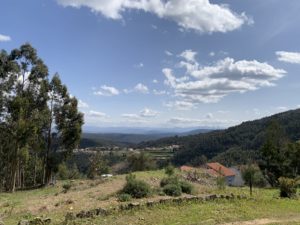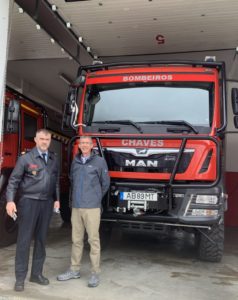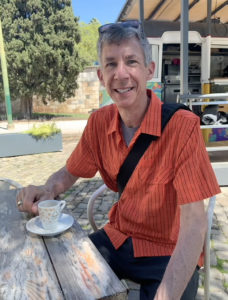Warner College of Natural Resources alumnus and affiliate, Michael Czaja, completed a month-long U.S. Department of State Fulbright Specialist project in Portugal earlier this year.
Czaja worked alongside the Agency for Integrated Rural Fire Management, working with stakeholders.

The Fulbright Specialist Program is an opportunity for U.S. academics and established professionals to engage in 2-6 week, project-based exchanges at host institutions across the globe. Specialists from a wide range of professional and academic disciplines are competitively selected to lend their expertise on these projects.
Crisis spurs collaboration around wildfire
In June and October of 2017, Portugal experienced extreme wildfires that burned over 1.3 million acres of forests, shrubland, and agricultural land. Over 100 lives were lost. The crisis left the country reeling and prompted significant changes in rural fire management. Founded in 2019, the Agency for Integrated Rural Fire Management is responsible for the planning, strategic coordination, and assessment of the recently developed Integrated Rural Fire Management System.
Czaja worked with integrate system stakeholders across the country to analyze and understand their beliefs and attitudes on preventing and suppressing rural fires in Portuguese territory. At the time, the stakeholders were participating in three pilot projects in the country’s north, center, and south regions. Czaja made recommendations to the host agency on different communications strategies they could implement.

These included encouraging system stakeholders to maintain realistic expectations for the future, given current unprecedented legal and policy chance within rural fire management processes. Other recommendations included implementing changes with pilot projects to identify successes and weaknesses in the integrated system. Czaja also advised stakeholders to reinforce and articulate the connection between the successful implementation of the integrated system and how this system would enable them to continue valuing and protecting their rural spaces and countryside. Finally, Czaja counseled system stakeholders to highlight activities across the many different levels of the integrated system to promote interagency cooperation and trust, while enabling the sharing of data and knowledge.
“With the new Integrated Rural Fire Management System in the middle of its pilot project process, effective communication strategies can reduce the uncertainty found during times of change,” Czaja said.
The communication strategies can also ensure that the Agency for Integrated Rural Fire Management and other Integrated Rural Fire Management stakeholders speak with a common voice when framing the issue. They are the foundation for further communication efforts that can be modified or expanded, based on both the progress of the pilot projects and interaction with Integrated Rural Fire Management stakeholders, political leaders, and the public.
“I had many candid conversations with stakeholders which I really appreciated,” Czaja said. “I gained great insight from those conversations about how the stakeholders view the system.”
Learning the landscape and culture
Since it was the most convenient form of transportation, Czaja spent the majority of his time driving on winding highways across the country to meet with various stakeholders. The long road trips in the Portuguese mountains were peaceful and beautiful, which made the drives bearable. In several locations, the landscape reminded him of Colorado’s front range.

“There is a Spanish word, querencia, which is like a sense of belonging or having an affinity for the landscape.
I have to admit, there were a couple times I really felt like I was connecting with the land around me,” Czaja said. “It was one of the best personal and professional experiences.”
Czaja and his wife have been in Germany since March 2020 and plan to return to the United States this summer. Once he returns, Czaja plans to continue working in emergency management and intends to pursue research and instructor opportunities.
Learn more about the Fulbright Specialist Program at https://col.st/L5Afn.
Learn more about Agency for Integrated Rural Fire Management at https://col.st/tQ71E.
Czaja would like to thank the following people who contributed to the success of the project: Tony Cheng, professor in the Department of Forest and Rangeland Stewardship, Gloria Edwards, Director at Southern Rockies Fire Science Network, Michael Manfredo, Department Head of Human Dimensions of Natural Resources, and Stuart Cottrell, professor in the Department of Human Dimensions and Natural Resources.